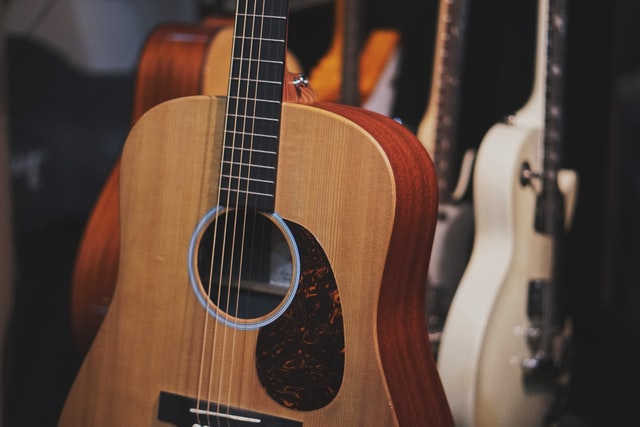Cleaning your acoustic guitar should be a part of your regular guitar care. Cleaning the body, fingerboard, and even the strings should all be included in this practice. You sweat and your skin becomes greasy. These natural secretions may cause damage to the guitar body, fingerboard, frets, and strings, which is unpleasant to speak about but real.
Table of Contents
1. Put It Away
When you’re not playing your guitar, the most essential thing to remember is to put it away. Because most acoustic guitars are composed of a single piece of wood, they are easily damaged if left lying about. While putting your instrument away every time you take a break may seem like a lot of work, it’s preferable to risk having your guitar knocked over. So, after you’ve done playing, place your guitar back in its case or consider using a guitar stand to keep it safe. If you’re taking the guitar with you on the road, keep it in a case or a gig bag.
2. After playing your acoustic guitar, wipe it down
Before putting your guitar away, wipe it off with a clean, dry towel after you’ve done playing it. Cleaning your guitar after each play may help protect the wood and strings from grease and grime from your fingertips. To avoid damaging the guitar’s finish, use a cloth made specifically for musical instruments. Clean the fingerboard and strings for oil, as well as the area surrounding the bridge for dust.
3. The temperature should not be too hot or too cold
Keep the temperature and humidity in mind while keeping your acoustic guitar. Temperature variations and extreme temperatures may potentially harm your guitar. If you’re transporting your guitar from one climate to another (for example, from a chilly automobile to a warm residence), we suggest keeping it in its case for a while to enable it to adjust to the temperature difference.
4. Moisture
Maintain a humidity level of 45-55 percent while keeping your instrument. High humidity may cause your guitar’s wood to expand, while low humidity might lead it to dry up and break – neither of which you want. Use a hygrometer to keep track of humidity, and take your guitar to a luthier or music store to get it checked if you’re worried about humidity damage.
The strings should then be loosened. String strain may cause the bridge to pull away from the instrument over time.
5. Purchase Guitar Insurance
If your guitar has been damaged, we always suggest bringing it to a luthier or guitar professional to get it fixed rather than attempting to repair it yourself, since this might result in greater damage down the road. We also suggest that you insure your instrument against any potential damage for added piece of mind.
- After you’ve finished playing, wipe off the guitar with a dry, clean towel.
- If required, replace the strings.
- Make sure the fingerboard is clean.
- Keep it in a cool, dry place.
- Consult a luthier if you’re in doubt.
- Buy guitar insurance.
After you’ve finished playing, how do you clean your guitar?
To clean your guitar strings, use a soft microfiber cleaning cloth. Wipe down your strings after each playing session to help maintain them clean and to slow down the natural oxidation process that tears down the material over time. The process of fretting notes (i.e. pressing the strings on the fret board) is more difficult on guitar because of the increased action and greater tension.
Is it a good idea to boil the strings on my guitar?
While boiling guitar strings improves the sound of old, flat strings, it does not make them sound brand new. Furthermore, boiling fresh guitar strings before stringing them on your guitar aids in the stretching process and improves tone and tension.
How should an acoustic guitar be maintained?
1. Store it in a secure location. When you’re not playing your guitar, the most essential thing to remember is to put it away.
2. After you’ve finished playing your acoustic guitar, wipe it off with a damp cloth.
3. Swap out the strings.
4. Apply a thin layer of oil on the fingerboard.
5. Humidity
6. Untangle the cords.
7. Protect your guitar by purchasing insurance.
Cleaning guitar with rubbing alcohol
Although rubbing alcohol or isopropyl alcohol is an excellent cleaner, it is not suggested for use on guitar strings. While rubbing alcohol is effective in removing dirt from guitar strings, it may harm your fret board.
Is it possible to use water to clean my acoustic guitar?
Try dampening the wiping cloth with a little mild detergent in water if you need a little additional cleaning power. Do not wet the instrument; instead, wet the towel. You’ll be able to manage how much water ends up on the surface this way. Acoustic Guitar Care and Maintenance has a section on washing guitars.
How should guitar strings be cleaned?
Because they don’t leave any residue or lint, microfiber towels are great for cleaning guitar strings. Wash your hands often to eliminate extra oil and residue in addition to wiping cleans the instrument. Having a little towel on hand to dry sweaty hands throughout the performance is a good idea.
Compress the acoustic guitar
Acoustic guitars have one of the most natural tones. As a result, when compressed unduly, it may easily sound squished. Compression enhances the percussive and rhythmic qualities of the guitar by bringing the sound of the strings forward.
How can you humidify a guitar that’s been exposed to the elements?
To keep a guitar at the appropriate humidity levels, we suggest utilising the Planet Waves Humidipak system. The Oasis or numerous Dampit brand humidifiers are recommended for re-humidifying a dry instrument.
